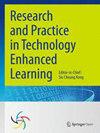Rater behaviors in peer evaluation: Patterns and early detection with learner model
IF 3.1
Q1 EDUCATION & EDUCATIONAL RESEARCH
Research and Practice in Technology Enhanced Learning
Pub Date : 2024-06-03
DOI:10.58459/rptel.2025.20012
引用次数: 0
Abstract
Peer evaluation is a common practice in team-based learning (TBL) designs, which can cover the assessment of individual or group work. However, the integrity of peer evaluation can be compromised by unserious raters—individuals who do not earnestly engage in the evaluation process. These raters may exhibit behaviors like consistently assigning the same score, rushing through evaluations, or evaluating before or long after the target presentations. This study delves into the issue of unserious peer evaluation in group presentations, with a specific focus on understanding the behavior patterns in the digital system. Utilizing evaluation behavior analysis (EBA) indicators, we identify patterns linked to unserious raters during the peer evaluation process. Meanwhile, we also connect these patterns to rating consistency and actual course performance, underscoring the significance of behavior patterns. Further, we conduct a preliminary analysis to explore the application of learner model data available before the peer evaluation starts for the early detection of unserious raters. This finding can assist teachers in providing personalized prompts and interventions before the peer evaluation stage, hence enhancing the evaluation quality through targeted interventions in a timely manner.互评中的评分者行为:学习者模型的模式和早期检测
同伴评价是基于团队的学习(TBL)设计中的一种常见做法,它可以涵盖对个人或小组工作的评估。然而,不认真的评价者--不认真参与评价过程的个人--可能会损害同伴评价的完整性。这些评分者可能表现出的行为包括:一成不变地给出相同的分数、匆忙完成评价、在目标展示之前或之后很久才进行评价。本研究深入探讨了小组展示中不认真的同伴评价问题,重点是了解数字系统中的行为模式。利用评价行为分析(EBA)指标,我们找出了同行评价过程中与不认真的评价者相关的模式。同时,我们还将这些模式与评分一致性和实际课程表现联系起来,强调了行为模式的重要性。此外,我们还进行了初步分析,以探索如何应用同伴互评开始前的学习者模型数据,及早发现不认真的评分者。这一发现可以帮助教师在互评阶段之前提供个性化的提示和干预,从而通过有针对性的干预及时提高评价质量。
本文章由计算机程序翻译,如有差异,请以英文原文为准。
求助全文
约1分钟内获得全文
求助全文
来源期刊

Research and Practice in Technology Enhanced Learning
Social Sciences-Education
CiteScore
7.10
自引率
3.10%
发文量
28
审稿时长
13 weeks
 求助内容:
求助内容: 应助结果提醒方式:
应助结果提醒方式:


